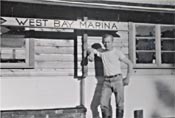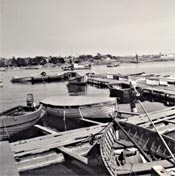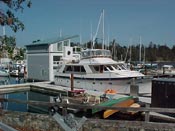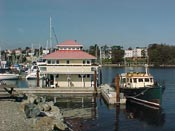|
|
|
Home /
Westbay Marine Village / Float Home Life Style
Float Home Life Style
People have been living and doing business from floating structures (as opposed to boats) throughout British Columbia’s modern history, some 150 years. Floating fish camps and logging camps have been a way of life for many years, sometimes cherished for its freedoms and pleasures, sometimes reviled for its isolation and loneliness. In fact there are still a number of floating logging camps active on our West Coast. Floathome living has been a form of modest cost living in urban environments since towns like Gastown (now Vancouver) and New Westminster were settled. The history of Floathome living in the Westbay area goes back to the 1880's when the locally famous Captain Jacobsen moored his sealing fleet in front of his magnificent home at 507 Head Street. This wonderful, whimsical Queen Anne styled home is practically next door to our Marina. Later Captain Jacobsen beached a retired stern-wheeler in front of his home and used it as a sort of modified floating office and housing. He even preferred to live in the stern wheeler instead of his gracious house.
In the 1960's and 1970's Floathome numbers grew in Coal Harbour in Vancouver, and on the Fraser River in locales such as Delta, Ladner, New Westminster, Richmond and others. More people were drawn to the free-spirited and romantic notion of living on the water unbound (except by mooring lines) by the constraints of land living. Alas, as municipalities and governing agencies of the Provincial and Federal Governments became more aware of the lack of regulation of the Floathome communities, the deficiencies of this form of housing became a constant concern. Lack of sewage collection, little or no fire protection, lack of garbage collection, no standards for the construction or maintenance of Floating Structures were some of the concerns raised by the authorities and neighbours. Also of concern was the fact that the bourgeoning number of floating village dwellers, including live-aboard boat owners, were entrenching themselves in the bigger community and were using municipal and other resources but were not contributing financially through real property taxes. The result was that all levels of government started to take steps to eliminate or closely regulate (and thereby eliminate said some) the Floathome and live-aboard boat lifestyle.
In the early 1990's the same wave of regulation swept over Victoria Harbour, of which Westbay is part. To the credit of the Marina owners in Westbay, they encouraged the Municipality and the Federal Government to consider regulating and legalizing the live-aboard and Floathome lifestyle. Instead of banning this marvelous lifestyle, allow proper facilities to be built to cater to this form of living was the plea. Embrace this highly desirable form of living, don’t eliminate it. Somewhat reluctantly the Municipality of Esquimalt called for a Local Area Plan (a sub-plan of their Official Community Plan) to be drafted and considered by the wider community. This process started in 1991 and continued on until the Local Area Plan’s final adoption in June 1996. The Local Area Plan process proved that the community saw the benefits of regulated Floathome and live-aboard living and how such lifestyles could mesh with a bigger vision of a mixed use village at Westbay, where tourists, local businesses, and floating residential uses could co-exist in harmony. Accordingly, in 1997 the Municipality of Esquimalt entered into a Marina Development Agreement with the Owners of Westbay Marine Village. The Federal Department of Transport also adopted the Marina Development Agreement concept. As a result, Westbay Marine Village is now the only legal, mixed use floating village on Southern Vancouver Island. Engineering, planning and rezoning of adjacent upland properties then took a further five years to accomplish. It has been a long process to get to this point. However, we believe it has been worth it. Floathome living in our Westbay Marine Village will be much more regulated and much more sophisticated than it has been in the past 150 years, but the essence of the lifestyle, romance and freedom, has not been diminished.
|
|||||||
 |


.jpg)



